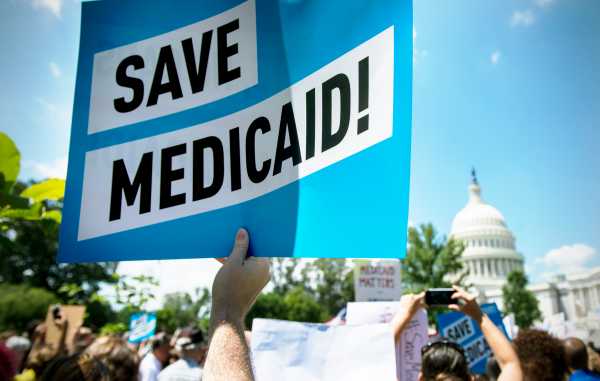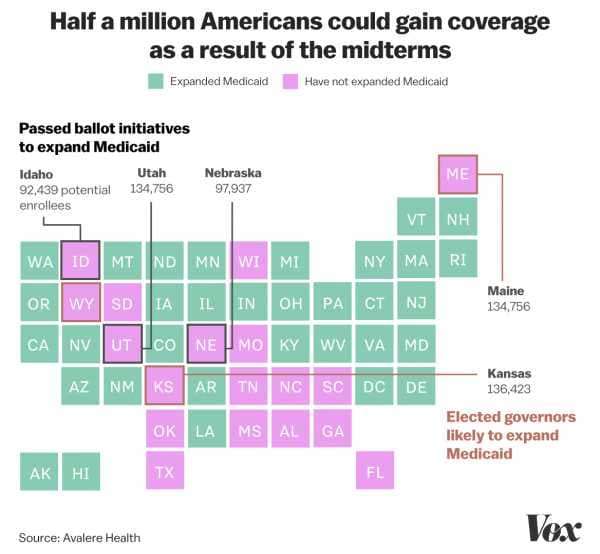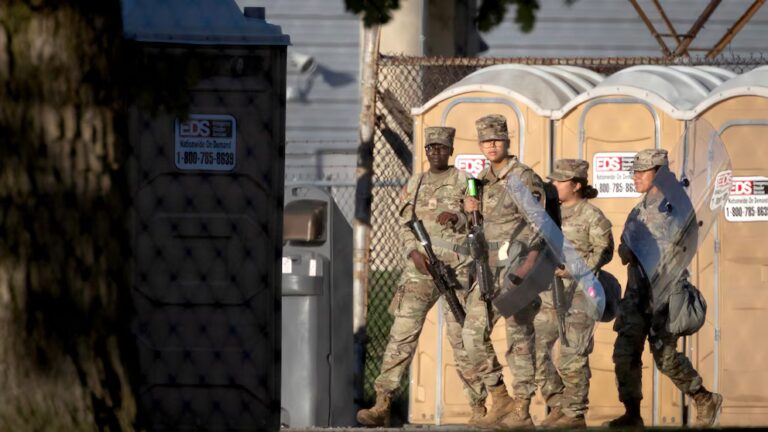
Medicaid had a stunning victory at the polls last night.
Three red states — Idaho, Nebraska, and Utah — passed ballot initiatives that will expand the public health insurance programs.
Two states — Kansas and Maine — elected governors that are likely to join the Medicaid expansion, too.
And one state, Wisconsin, put a Democratic governor in office who could roll back plans to require Medicaid recipients to work.
Taken together, this could mean that 500,000 low-income Americans gain health insurance as a result of Tuesday’s votes.

The Medicaid program has quietly proved to be a political success in a way that the Affordable Care Act has not. Even conservative voters who oppose President Obama and his health care law seem to support the program that gives health benefits to poor Americans.
Related
Medicaid expansion is on the ballot in four key states
Medicaid expansion is part of Obamacare, but voters don’t seem to see it that way. Take, for example, a revealing poll from Boise State University. It asked potential voters whether they approve or disapprove of both Obamacare and of Medicaid expansion.
It found that just 35 percent of Idaho voters approve of the Affordable Care Act — while 75 wanted the state to participate in Medicaid expansion. The portion of Idahoans who ultimately supported the ballot wasn’t quite that large but still really significant: 61 percent.
That Medicaid could win by a double-digit in a state that is also electing Republican legislators and a governor by similarly large margins tells you something about the program’s bipartisan appeal. Medicaid has succeeded where Obamacare hasn’t: in winning over voters across a wide ideological spectrum.
How three ballot initiatives — and two governor’s races — could add a half-million people to Medicaid’s rolls
The three ballot initiatives that passed last night are a pretty straightforward path to Medicaid expansion. The governors in those states are not expected to block the program, as outgoing Gov. Paul LePage has in Maine. This means that, in the coming months, low-income residents of Idaho, Nebraska, and Utah should be able to sign up for coverage.
The governors’ elections, meanwhile, are a slightly less straightforward (and not totally finished) path to Medicaid expansion.
In Maine, governor-elect Janet Mills has run on expanding Medicaid expansion as soon as she takes office — and has already reiterated that commitment since her Tuesday night victory.
Mills would actually be enacting a ballot initiative that Maine passed in 2017, but that LePage has refused to implement. Despite court orders to expand, LePage has gone as far as to say he’d go to jail before putting the ballot initiative into action.
Meanwhile, in Kansas, Laura Kelly’s governor race victory over Republican Kris Kobach opens up a serious path towards moving Medicaid expansion forward.
The Kansas legislature passed a bill to expand Medicaid in 2017, only to have it vetoed by then-Gov. Sam Brownback. The legislature fell just a few votes shy of the votes they needed to overturn that veto, and the effort fizzled.
Kelly has run on Medicaid expansion and, given the legislature’s previous support, there seems to be a decent chance of that moving forward.
Medicaid expansion is associated with better access to care and better outcomes
What happens when states expand Medicaid? A growing body of research finds that low-income Americans start getting more access to health care and experience better health outcomes as a result.
“In terms of what happens to patients, we have 40-plus studies looking at this over the past decade,” says Benjamin Sommers, a health economist at Harvard who studies Medicaid expansion. “It makes a major difference in patients’ ability to access health care, to pay their bills, and in many studies, we see improved health outcomes too.”
States that expanded Medicaid tend to see their populations having greater access to a wide array of health care services, from primary care to substance abuse treatment to surgery. Patients report having an easier time paying their medical bills after gaining coverage through Medicaid and carry less debt.
It’s still early, but researchers have found better health outcomes in the states that have expanded Medicaid. One study in the Journal of American Public Health, for example, found that states expanding Medicaid have seen a greater decline in infant mortality than those who do not participate in the program. Another that Sommers worked on showed that Medicaid actually saved lives for among patients with kidney disease who are starting dialysis.
Studies that ask patients to describe their own health find significant increases in people reporting themselves to be in “excellent health” after Medicaid expansion, too.
Taken together, this shows that Medicaid expansion makes a huge difference in the lives of the people who gain coverage — and there will be hundreds of thousands more of those people as a result of Tuesday’s elections.
Sourse: vox.com






